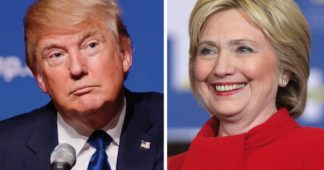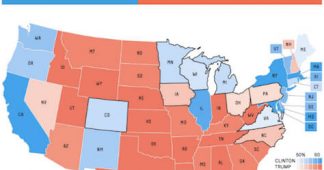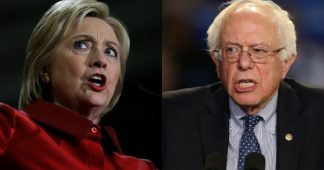Donald Trump’s victory in the presidential election in the US, unexpected by the majority of political commentators, initially caused a shock followed by a wave of comments. These comments reflect the bewilderment of the experts and ideologues in the face of the new reality, the meaning which they refuse to understand.
Liberals, both Western and Russian, are now panicking. All of a sudden, these people realized the undemocratic nature of the American indirect election system, which they were accepting at face value before the voting took place. Even before the last vote was counted, they announced that since Clinton won the popular vote, Trump’s presidency cannot be considered legitimate.
They organize mass protests against the election results, which, by their own admission, did not contradict constitutional rules. These people conveniently forgot how meekly they accepted falsifications which helped Clinton deny the nomination to her opponent Bernie Sanders. While being resentful of the Electoral College system, they call on the Electoral College members to ignore the will of the voters in their states, and to vote for Clinton, since Trump is “unfit to serve”. A petition addressed to the electors initiated by the liberals gathered more than three million signatures. This is not only an unprecedented open call for a coup d’état, but also a cry of despair.
The conservatives, on the contrary, are elated. But here not everything is as straightforward as it might seem. Russian journalists belonging to the nationalist camp are somewhat confused. Although they advertised Trump for several months, his victory was not only unexpected, but also stroke a blow to their worldview, since according to it Trump just could not win. The more correct his ideology was from the point of view of a Russian conservative, the fewer chances he had to achieve success in the corrupt liberal America.
The victory of an outsider, who opposed the establishment and the financial capital, proves that democracy exists in the US, even if it is limited by the size of the candidate’s bank account. But acceptance of this fact shatters the whole propagandist concept. Our conservatives did not criticize the power of money, they rather criticized the power of the liberal media establishment propped up by the might of the deep state, which decided not to allow Trump presidency. Now they have to admit that either the deep state does not exist, or it is not as potent as they were trying to prove…
Democratic breakthrough in US is a bad example for a Russian man in the street, since the thesis: “everybody else has the same or even worse”, was always an excuse for our own deformities. Now, turns out, the others, the hated Americans, have it better. Not much better, but one can see the difference…
Turns out that, in the Russian ideological context, Trump’s victory undermined both dominant discourses: the liberal one (defeat of Hillary Clinton destroyed the idea of America’s progressive values, which we must follow), and conservative (about an insidious liberal plot which does not allow a “good guy” to win in a fair election).
And what about the left?
It is hard to stay away from gloating while pointing out that “Rabkor” was among a very few publications which wrote about the possibility of Trump’s victory. Sometimes it makes sense to be in the minority.
But, alas, the majority of the commentaries in Russia and US are amazingly similar. As a matter of fact, one can find only two most common interpretations. On one hand, a universal catastrophe generated by the uprising of the uneducated, wild and terrible monster rednecks (“white males” according to the liberals who use this term to characterize all unpleasant people irrespectively of their gender or skin color) is being prophesized. We are being told that Trump’s administration will crash the economy, initiate mass repressions of women and homosexuals, round up Mexicans into concentration camps, initiate Muslim holocaust, inflict terrible suffering on blacks, and, in the long run, will destroy the healthcare and the planet by its anti-environment actions.
On the other hand, we are being promised that nothing new will happen; that the US and the rest of the world will resume moving in the same direction after a four year break. We just have to survive this unpleasant time.
The paradox is that these two scenarios merge: we will have four years of apocalypses, and then – business as usual.
Alas, the authors of such prognoses are mistaken again. There will be neither apocalypses, nor return to the past.
Trumps victory is not a result of an unpleasant coincidence; it is a result of a systemic social-economic crisis due to the fact that the current capitalist model of development is completely exhausted. It is not that the system will collapse because of the Trump’s success, but rather his success is caused by the collapse of the system.
It is impossible to return to the trajectory of global liberalization. If this way was still effective and had a future, the Republican candidate would not have stood a chance of winning. While going against the majority of the press, all of the Washington D.C. elite, cable channels, popular journalists, experts, and official ideologues, against the apparatuses of both parties, against the official right and liberal left, he won precisely because their time has gone, their methods and strategies stopped working. The public opinion was just a reflection, albeit a delayed one, of the changes in the economics and the real world.
What the consequences of this victory will prove to be is a different issue.
The stories of impending totalitarian repressions to which Trump will subject women and various minorities are just absurd and false propaganda by liberals, who used it to try scare the American public, but only succeeded in drawing themselves into a state of panic hysteria. The limitations on immigration will indeed take place, and this would without a doubt result in an increase of the popularity of the new president among African Americans, Latinos, and all poor people in general, since they are the ones who lose from the competition with the illegal immigrants (as opposed to the privileged white upper middle class who profit from the cheap labor of the illegal aliens). Mexican unemployed workers, instead of having to risk lives while crossing the border into the US, and making a living by drug trafficking, will get an opportunity to make decent money building a multikilometer wall between the two states. Construction companies will get contracts; the infrastructure will grow.
A similar wall, just a virtual one, created by the protectionist trade policies will protect America from the influx of Chinese products promoting growth of national production and job creation. The transatlantic and transpacific partnerships, so vigorously opposed by the left, will be buried. The interventionist plans of the Democratic administration, which constantly expanded US presence in the Eastern Europe and the Middle East, will be at least postponed.
And, even if the hopes that the new American government will completely abandon the policies of interference into the internal affairs of independent countries turn out to be exaggerated, the extent of this interference will certainly decrease.
Does this mean that Trump presidency will be a blessing for the world?
It would be ill-advised to make such a statement. The turn in the US policies we are witnessing will cause a lot of problems and conflicts, but not the ones that the liberal journalists are trying to scare us with. It will give a start to the important positive shifts, but not the ones that our conservatives are dreaming about.
Protectionist defense of the American market combined with large-scale construction projects in line with the recommendation of John M. Keynes will stimulate growth in the US, even if these projects will be ridiculous and meaningless (just like the huge pit that Keynes ironically suggested to dig in England to overcome the economic depression). But American growth will not pull other economies out of the crisis; on the contrary, it will exacerbate their difficulties. The only countries that might somewhat benefit are the US neighbors: Mexico and Canada. Transnational corporations will have to move the production closer to the consumer markets.
The Western Europe is doomed either to repeat the US measures or risk plunging into a deep recession.
The world crisis will only deepen outside the US. China’s chances to compensate for the partial loss of the American market by yuan devaluation or expansion in other directions are very slim. Following the US lead, other countries will be forced to protect their own production. Chinese crisis will decrease the demand for Russian natural resources, demonstrating, yet once again, the terrible consequences of the deindustrialization implemented in our country. Oil prices already dropped in the aftermath of the US elections.
It is anyone’s guess how fast the turn will happen in the Western Europe, and how high will be the price to pay. Brexit showed the way, but it did not become a European trend yet, since European bureaucracy, carefully structured and layered, is an even greater impediment for the political and social changes than the American establishment.
It still may happen that it will be Russia controlled by oil tycoons that will stand as a last bastion of economic liberalism. But even here the positions of the ruling class will be weakening under the pressure from the new realities of the world markets. The objective change in the balance of the forces in the society will sooner or later not only allow the opportunity for change, but will also cause the realization of its necessity, just like it is happening in the USA and Europe.
In the meantime, none of the American social problems will be solved. Trump, not only is not getting ready to solve them, but also, it seems, has no idea they exist, thinking sincerely that creating a few million jobs and somewhat increasing the salaries will suffice. However, the combination of the economic growth with unsolved social problems is the surest recipe for a revolution. If president Trump will succeed in solving the economic problems, if he will be even partially successful in fulfilling his promises and plans, it will not cancel the urgency of a large scale social modernization, including creation of universal and affordable healthcare and education systems, extension of the trade union rights, and expansion of the public sector. On the contrary, the economic growth will make these demands more convincing and popular, and will strengthen social movements advocating for the reforms.
Trade unions, workers’ movements and wage-earners feel much more confident in the conditions of the economic growth. The conflicts will not be fading away, they will grow.
The question is: will Trump be able to realize his economic program even partially? The block of financial capital, Washington political establishment, and corrupt liberal left intelligentsia, unbreakable in its unity, will fight his protectionist policies. Political influence of this block is based on the fragmentation of the society, promoted by the ruling class, with the enthusiastic support from the left in the last 30 years. All attempts at social solidarity were eradicated by dividing the society into numerous vertically organized and competing “minorities”, which could be manipulated in order to implement policies benefitting the elites. The 2016 election demonstrated that this situation is changing.
Both Bernie Sanders’ campaign, and voting for Trump, demonstrated, the last one to a higher degree, that the lower classes of the society are willing to consolidate, independently from the appeals of the self-proclaimed “defenders of the minorities”.
An African-American laborer realizes that he has much more in common with a “white male” laborer than with a privileged liberal smugly reasoning about the need for political correctness. A single mother fighting for survival understands how alien are the interests and the views of a feminist who distributes multimillion gender related grants among her friends and clients.
A spontaneous surge in solidarity generated by the Sanders campaign did not end after the Vermont senator capitulated. These were his followers in Wisconsin, Michigan, Ohio, and other traditionally Democratic states who decided the outcome of the election by refusing to vote for Clinton or by giving their vote to Trump. The Latino votes predetermined Trump victory in Florida. Bernie Sanders sensed this new reality well when he, after all politically correct qualifications, offered to collaborate with the winner.
After the progressive senator capitulation to the liberal establishment, his social base did not follow him, they followed Trump. Now the senator does not have a choice, but to follow his social base.
The 2016 elections signified the collapse of the politics of political correctness, and created the preconditions of its substitution by the politics of solidarity. The hysterical reaction of the liberal circles in the USA confirms that even if they do not realize the scope and significance of the ongoing process, they feel intuitively that the earth is shifting under their feet. They can continue to scare each other and the minorities for a while by the imminent repressions by the new administration, but they themselves clearly understand that this is false.
An active work is needed in order to create the preconditions for a new progressive movement in the USA. This movement, provoked by the Bernie Sanders campaign, is already a reality of the American life, but it will only reach a success when it will realize that their interests are the exact opposite and are incompatible with the interests of the left liberal elite, who are aligned with the Democratic Party. The split will be hard and painful, but it is necessary.
With respect to Russia, the American lesson is very simple. If the left movement seriously aspires to play a role in real, not imaginary, politics, it has to break decisively with liberal illusions and the corresponding discourse.











